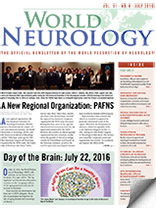Guidelines for the Diagnosis and Treatment of Zika Virus-Associated Guillain-Barré Syndrome in Colombia
By Gustavo C. Román, MD, and Rodrigo Pardo-Turriago, MD

Gustavo C. Román, MD
Organized under the direction of Yuri Takeuchi, MD, president of the Colombian Congress of Neurology and dean of the School of Health Sciences at Icesi University, Cali, Colombia, and Dr. Ignacio E. Abello, president of the Colombian Neurology Association (ACN), the XII Annual Colombian Congress of Neurology in Cali attracted more than 700 participants, a record number for the annual neurology Congress. The steady increase in the number of neurologists in this South American country and the quality of the program addressing the educational needs of Colombian neurologists explain the success of the Congress.
The scientific sessions were preceded by well-attended workshops on
- “Intensive Care in Neurology,” conducted by guest speakers Dr. José I. Suárez, Baylor College of Medicine, Houston, Texas, and Dr. Jorge Mejàa, Fundación Valle del Lili, Cali, Colombia
- “Multiple Sclerosis,” presented by Jairo Quiñones, Colombia, Daniel Becker, Johns Hopkins, Baltimore, and Patricia Coyle, New York

Rodrigo Pardo-Turriago, MD
- “Epilepsy & EEG,” presented by Louis Wagner, The Hague, Holland, Andrew J. Cole, University of California, Los Angeles, and Ruben Kuzniecky, New York University
- “Pediatric Neurology,” presented by J.F. Gómez, Colombia, and D. Lachhwani, Cleveland Clinic Abu Dhabi
- “EMG & Neurophysiology,” presented by Mark Bromberg, Utah, Antonino Uncini, Italy, and Mamede de Carvalho, University of Lisbon, Portugal
- “Neuroimaging,” presented by Ana Maria Granados and Sonia Bermudez, Colombia, and J. Romero, Harvard
- “Abnormal Movements,” presented by Jens Volkman, Germany, Eduardo Tolosa, Spain, and Andrew Lees, London
- “Neurooncology,” presented by Camilo Fadul, Darmouth College, Hanover, New Hampshire. There were also sessions on controversies in epilepsy, headache, neuromuscular disease, Parkinson’s disease, dementia, stroke, and multiple sclerosis. Posters and platform presentations also added to the quality of the Congress.

Official inauguration of the XII Colombian Congress of Neurology by Yuri Takeuchi, MD, Congress president.
Colombia, like many other countries in South and Central America, has been affected by the Zika virus epidemic with unprecedented viral neurotropic effects manifested by Guillain-Barré syndrome (GBS) in adults and microcephaly as a result of prenatal infection of pregnant women. At the time of the Colombian Congress, a total of 31,555 cases of Zika infection had been reported in Colombia, including 25,950 confirmed clinically, 1,504 with laboratory confirmation, and 4,101 classified as suspected cases. The same vectors of dengue and chikungunya, particularly Aedes aegypti and Aedes albopictus, transmit Zika virus. Large areas of the Colombian territory are endemic or hyperendemic for dengue, suggesting that Zika infection may become widespread.

Yuri Takeuchi, MD, president of the XII Colombian Congress of Neurology, wearing the official scarf of the WFN.
The guidelines for the diagnosis and comprehensive treatment of patients with GBS during the Zika epidemic were prepared for the Ministry of Health of Colombia by a panel of national and international specialists in neurology and pediatric neurology under the leadership of Dr. Rodrigo Pardo-Turriago, professor of neurology at the National University of Colombia. The group met on Feb. 29, 2016, during the Colombian Congress of Neurology in Cali, and the resulting guidelines were presented for the first time to the Colombian neurologists attending the Congress. These guidelines will be adapted and used as a model for intervention in other Latin American countries affected by the Zika virus epidemic.
Information on the clinical manifestations and epidemiological management of suspected Zika cases was prepared for the Ministry of Health of Colombia by experts in virology, public health, epidemiology, neurology, neuroimaging, pediatric neurology, genetics, maternal and fetal health, and obstetrics and gynecology.
The Colombian Ministry of Health and the Pan-American Health Organization in Washington sponsored the preparation of these guidelines.
